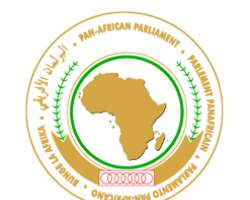PAP Debates Peace and Security in Africa

JOHANNESBURG, South-Africa, October 17, 2012/African Press Organization (APO)/ -- The Pan-African Parliament (PAP) today debated issues of peace and security in Africa.
In a report presented by Hon. Marwick Khumalo, Chairperson of the Committee on Cooperation, International Relations and Conflict Resolution, the situation in the Democratic Republic of Congo, Somalia and Guinea (Conakry) was discussed.
Hon. Khumalo said that “the flawed 2011 presidential and legislative elections were a major setback for the democratisation process in the Democratic Republic of Congo (DRC) and had a detrimental effect on the country's stability”.
The report also welcomed the transition in Somalia in September 2012, whereby Hassan Sheikh Mohamud was sworn-in as the President of the country in line with the 2011 end of transition roadmap. “Somalia has seen remarkable progress in areas of security, constitution-making, political outreach and good governance since the roadmap agreement was signed. The most visible achievements of the transition process ere the successful nomination and swearing-in of Members of the new Somali Parliament, the election of the Speaker and his two deputies and the election and swearing in of the President”, Hon. Khumalo added.
On Guinea, the report said that one of the key factors fuelling tensions is the government's reluctance to hold legislative elections.
In a presentation to the House, Dr. Admore Mupoki Kambudzi, Secretary of the Peace and Security Council of the African Union (AU) outlined the peace and security situation in some conflict and post-conflict areas on the continent, such as the Central African Republic, Democratic Republic of Congo, Libya, Madagascar, Mali and Somalia. “The African Union with the support of the international community continues its efforts to resolve existing conflicts and to stabilize post-conflict situations focusing on socio-economic recovery”, he said.
The House also listened to two fact-finding mission reports to Mali and to Sudan and South Sudan. Their aim was to “collect maximum information from members of Government, political forces, civil society organizations and religious denominations”.
The Mali mission was headed by Hon Roger Nkodo Dang, First Vice President of the PAP. Social malaise, administrative division, electoral register, lack of well-equipped and strong army and the coup d'état of March 2012, were identified as some of the causes of the political crisis in Mali. The mission recommended that there needs to be an “urgent organization of an inclusive national dialogue between all Malian socio-political strata, putting in place a government of national unity and secure transitional organs,” among other things.
The Sudan and South Sudan mission which was headed by the Fourth Vice President of the PAP, Hon. Juliana Kantengwa, looked into the escalating tensions between the two states. Although South Sudan attained its independence on 9th July 2011, security, border demarcation, status of nationals, and the Abyei region question are some of the issues that are yet to be resolved.
On 27th September 2012, Presidents Omar Al Bashir and Salva Kiir of Sudan and South Sudan respectively, signed a series of agreements in Addis Ababa Ethiopia to end the conflict between the two nations. “The signing of the agreements provides vital elements in building a strong foundation for a stable and prosperous future between the two countries”, the report said.
The House then debated the various reports and adopted them after a lively discussion.
The First Ordinary Session of the Third Parliament, which began on 8th October 2012, will continue until Friday 19th October 2012.
